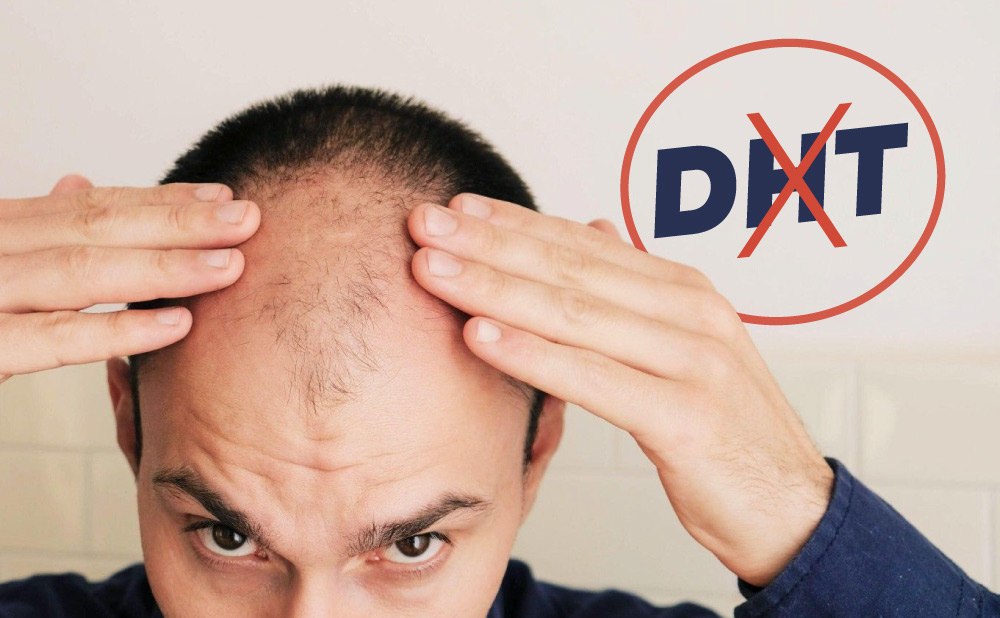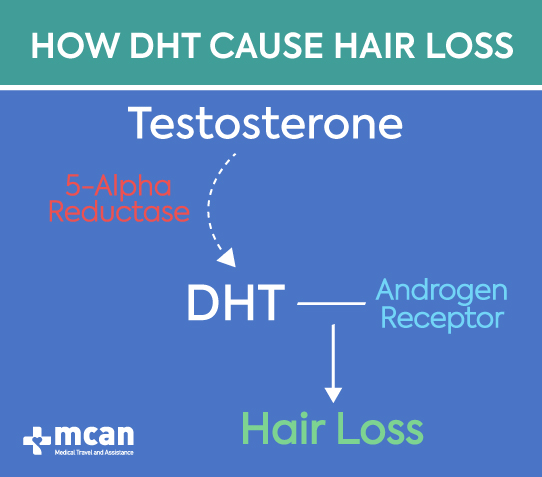
Hair loss can be frustrating and take a toll on your confidence. Whether it’s a receding hairline, thinning strands, or bald patches, the impact can feel overwhelming. If you’re seeking solutions, you’ve likely come across DHT blockers designed to target one of the primary causes of hair loss.
In this comprehensive guide, we’ll explore everything you need to know about DHT blockers: how they work, the different types available, and their potential side effects. We’ll also compare them to other hair restoration methods, such as hair transplants, so you can choose the right approach for your needs.
Whether you’re considering medication, natural supplements, or surgical options, we’re here to help you make an informed decision.
What is DHT?
DHT, or dihydrotestosterone, is a hormone derived from testosterone. It plays a key role during puberty, helping with the development of male traits like facial hair, a deeper voice, and increased muscle mass. However, as you age, DHT’s role in the body changes.
For some individuals, DHT can become a factor in hair-related issues. It’s one of the hormones responsible for changes in the scalp, which may affect hair health over time. Although everyone produces DHT, not everyone’s hair is equally sensitive to it. Understanding this hormone is a crucial step toward addressing hair loss effectively.
Why Does DHT Cause Hair Loss?
Hair loss happens when DHT attaches to androgen receptors in your scalp. This disrupts the hair growth cycle, making hair thinner and weaker over time. Eventually, it may stop growing altogether.
The enzyme 5-alpha-reductase plays a big role in this process. It converts testosterone into DHT, which is why people with higher levels of this enzyme may experience hair loss more quickly. If your hairline is receding or you notice thinning, DHT and 5-alpha-reductase could be the culprits.

The link between DHT and hair loss is well-known, especially in androgenic alopecia, also called male pattern baldness. If your hairline is receding or you see thinning, DHT could be the reason. Acting early can help protect your hair.
What is a DHT Blocker?
DHT blockers come in different forms, like pills, natural supplements, and shampoos. While they all work differently, their main goal is the same: tackling one of the biggest causes of hair loss.
DHT blockers are especially helpful for people dealing with androgenic alopecia. Since DHT is behind most cases of this type of hair loss, using a blocker can make a big difference in managing it and keeping your hair healthier.
How Do DHT Blockers Work?
DHT blockers work by stopping your body from producing too much DHT, the hormone responsible for shrinking hair follicles. They do this by targeting an enzyme called 5-alpha-reductase, which converts testosterone into DHT.
By lowering DHT levels, these treatments protect your hair follicles and can slow or stop hair loss. Some DHT blockers, especially topical ones like shampoos, also prevent DHT from attaching to the scalp.
With consistent use, DHT blockers can help maintain healthier hair follicles, giving your hair a better chance to grow stronger and thicker.
Types of DHT Blockers
DHT blockers come in different forms, giving you plenty of options to find what works best for you. Here’s a closer look:
Pharmaceutical DHT Blockers
- Finasteride: A prescription medication that helps reduce DHT levels and is FDA-approved for male pattern baldness.
- Dutasteride: A stronger option for severe cases of hair loss, often prescribed under medical supervision.
Natural DHT Blockers

- Saw Palmetto: A popular plant-based remedy that lowers DHT naturally. It’s a common ingredient in supplements and shampoos.
- Pumpkin Seed Oil: Packed with nutrients, this oil has been shown to improve hair growth when used consistently.
- Green Tea Extract: Known for its anti-inflammatory properties, it helps reduce DHT and supports scalp health.
- Pygeum Bark Extract: Derived from the African cherry tree, this extract may help block DHT and reduce scalp irritation.
- Stinging Nettle Root: Often found in herbal supplements, this root is believed to lower DHT levels and promote hair growth.
- Lycopene: Found in tomatoes and watermelons, lycopene is an antioxidant that may help balance DHT levels in the body.
- Reishi Mushroom: This adaptogenic mushroom is known for its ability to reduce DHT and improve overall scalp health.
Topical DHT Blockers
- DHT-blocking Shampoos: These shampoos contain ingredients like caffeine or ketoconazole to directly target DHT on the scalp. They’re easy to add to your routine.
- Scalp Serums: Many serums combine natural extracts with active ingredients to nourish the scalp and block DHT.
Who Should Use DHT Blockers?
DHT blockers are suitable for individuals in the early stages of hair loss, where they can slow the progression and protect existing hair. Nearly 50 percent of men over 50 experience male pattern baldness, while around 40 percent of women notice some degree of thinning by the time they reach 50.
For women, these treatments can be effective, but it is essential to consult a doctor first, especially with pharmaceutical options like finasteride, which may affect hormones. Women who are pregnant or planning to conceive should avoid DHT blockers.
For advanced hair loss, where hair follicles are no longer producing hair, surgical solutions like FUE or DHI transplants may be a better choice.
How Long Do DHT Blockers Take to Work?
Results from DHT blockers take time. Most people notice improvements after three to six months of consistent use. The speed of results depends on how severe your hair loss is and the type of treatment you choose. Staying patient and sticking to your routine is key.
Potential Side Effects of DHT Blockers
Like all treatments, DHT blockers may have side effects. Here are some to keep in mind:
| Category | Side Effects | Notes |
|---|---|---|
| Mild Effects | Fatigue, dizziness, or headaches | Common and typically temporary |
| Hormonal Impact | Reduced libido or changes in sexual health | Rare and often resolve over time |
| Skin Reactions | Rashes or dryness (from topical products) | More likely with topical DHT-blocking treatments |
Always consult with a healthcare provider to weigh the benefits and potential risks of DHT blockers for your individual needs.
Alternatives to DHT Blockers
DHT blockers aren’t the only option for treating hair loss. If they don’t work for you or if you prefer other approaches, there are several effective alternatives. These include non-medical treatments and permanent solutions like hair transplants, giving you flexibility based on your needs and goals.
Non-Medical Options
- Minoxidil: This topical treatment is widely used to promote hair growth. It works by increasing blood flow to the scalp, which helps nourish hair follicles and encourage new growth.
- PRP Therapy: Platelet-Rich Plasma (PRP) injections use your own blood’s platelets to stimulate hair regrowth. This treatment is known for being natural and minimally invasive.
Hair Transplants
For advanced hair loss, surgical solutions like FUE (Follicular Unit Extraction) and DHI (Direct Hair Implantation) offer permanent results. These procedures involve moving healthy hair follicles from donor areas to balding spots, restoring a fuller, natural-looking hairline.
Each alternative has its own advantages, and the right choice depends on your hair loss stage and personal preferences. A consultation with a hair specialist can help determine the best path for you.
Comparing DHT Blockers vs. Hair Transplants
DHT blockers and hair transplants both address hair loss, but they work differently. Hair transplants provide permanent results by restoring lost hair, while DHT blockers focus on slowing or stopping further loss. Choosing the right option depends on your hair loss severity and goals.
| Feature | DHT Blockers | Hair Transplants |
|---|---|---|
| Purpose | Slows or stops further hair loss | Restores hair permanently in bald or thinning areas |
| Effectiveness | Works best for early or moderate hair loss | Effective for advanced hair loss and balding |
| Time to See Results | 3 to 6 months of consistent use | Immediate results with full growth in 6-12 months |
| Maintenance | Requires ongoing use to sustain effects | No maintenance once the transplant is complete |
| Cost | Lower initial cost but adds up with long-term use | Higher upfront cost but offers permanent results |
| Side Effects | May include mild fatigue or hormonal changes | Temporary swelling or redness post-surgery |
Hair Transplant in Turkey with MCAN Health for Perfect Hair Loss Solution
While DHT blockers can slow hair loss, they may not restore hair in areas already affected by baldness. For those seeking a permanent solution, hair transplants offer a proven method to regain a natural, full appearance.
MCAN Health is a leading provider of hair transplants in Turkey, offering advanced techniques like FUE hair transplant and DHI hair transplant. Our procedures are designed to address hair loss caused by conditions like androgenic alopecia, where DHT has already affected hair growth. Unlike treatments that only manage hair loss, transplants provide a long-term fix by restoring hair in balding areas.
Patient Stories
Real patient experiences highlight the transformative power of hair restoration. One such inspiring story is from Michael, a 30-year-old who initially tried DHT blockers to address his hair loss. While these treatments helped slow the thinning, they didn’t restore the fullness he had hoped for, leaving him searching for a more permanent solution.

That’s when Michael turned to MCAN Health for a 3,000-graft FUE hair transplant. The clinic’s expert team worked closely with him to design a natural-looking hairline that suited his facial structure. Michael shared how the staff made him feel supported throughout the process, from designing his new hairline to providing excellent post-surgery care.
Although DHT blockers had their benefits, Michael felt his hair transplant at MCAN Health delivered the life-changing results he was seeking. Today, he’s thrilled with his fuller hair and newfound confidence.
Michael’s story demonstrates how combining treatments like DHT blockers with advanced solutions like hair transplants can achieve remarkable outcomes. If you’re ready to explore your options, MCAN Health is here to guide you every step of the way.
Before and After Transformation
Our patients have seen incredible results, as shown in their hair transplant before and after photos.
Here is a MCAN Health patient who took the step toward permanent hair restoration
With MCAN Health’s expertise, you can achieve similar results and enjoy personalized care, all-inclusive packages, and a seamless experience.
FAQs About DHT Blockers
Got questions about DHT blockers? Here are answers to some of the most common concerns to help you make informed decisions.
Do natural DHT blockers work?
Yes, natural options like saw palmetto can help with mild hair loss. While they are less potent than pharmaceutical treatments like finasteride, they can still be a good choice for those looking for a gentler approach.
Can DHT blockers stop hair loss completely?
DHT blockers are effective at slowing or stopping hair loss for many people. However, they don’t usually restore hair that has already been lost. For permanent results in areas of baldness, hair transplants are often the best option.
Are DHT blockers safe for long-term use?
Yes, most DHT blockers are considered safe for long-term use, especially when monitored by a healthcare provider. Be sure to discuss any concerns with your doctor, particularly if you experience side effects.
Can women use DHT blockers?
Yes, women can use DHT blockers, but they should consult a doctor first. Pharmaceutical options like finasteride can affect hormones and are typically used with caution in women.
How long does it take for DHT blockers to show results?
Most people see improvements within three to six months of consistent use. However, results vary depending on the severity of hair loss and the type of DHT blocker used. Patience and regular use are key.

 Can Hair Transplant Cover Whole Head?
Can Hair Transplant Cover Whole Head?  How to Cut Your Own Hair Like a Pro
How to Cut Your Own Hair Like a Pro